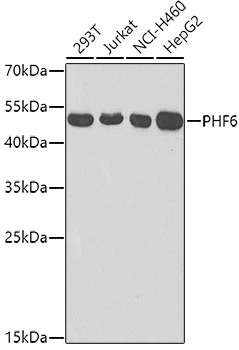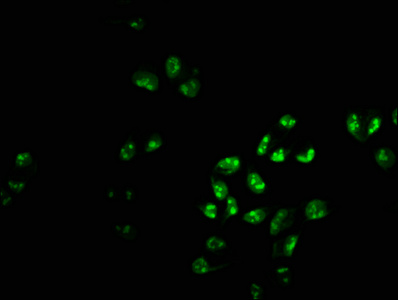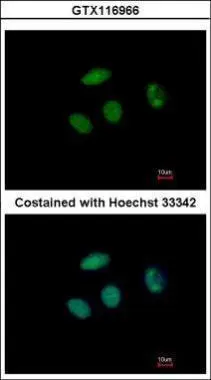
WB analysis of various sample lysates using GTX33408 PHF6 antibody. The signal was developed with ECL plus-Enhanced. Dilution : 1:1000 Loading : 25μg per lane
PHF6 antibody
GTX33408
ApplicationsWestern Blot
Product group Antibodies
ReactivityHuman
TargetPHF6
Overview
- SupplierGeneTex
- Product NamePHF6 antibody
- Delivery Days Customer9
- Application Supplier NoteWB: 1:500 - 1:2000. *Optimal dilutions/concentrations should be determined by the researcher.Not tested in other applications.
- ApplicationsWestern Blot
- CertificationResearch Use Only
- ClonalityPolyclonal
- ConjugateUnconjugated
- Gene ID84295
- Target namePHF6
- Target descriptionPHD finger protein 6
- Target synonymsBFLS, BORJ, CENP-31, PHD finger protein 6, PHD-like zinc finger protein, centromere protein 31
- HostRabbit
- IsotypeIgG
- Protein IDQ8IWS0
- Protein NamePHD finger protein 6
- Scientific DescriptionThis gene is a member of the plant homeodomain (PHD)-like finger (PHF) family. It encodes a protein with two PHD-type zinc finger domains, indicating a potential role in transcriptional regulation, that localizes to the nucleolus. Mutations affecting the coding region of this gene or the splicing of the transcript have been associated with Borjeson-Forssman-Lehmann syndrome (BFLS), a disorder characterized by cognitive disability, epilepsy, hypogonadism, hypometabolism, obesity, swelling of subcutaneous tissue of the face, narrow palpebral fissures, and large ears. Alternate splicing results in multiple transcript variants, encoding different isoforms. [provided by RefSeq, Jun 2010]
- ReactivityHuman
- Storage Instruction-20°C or -80°C,2°C to 8°C
- UNSPSC41116161





